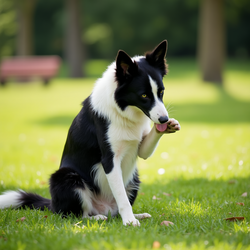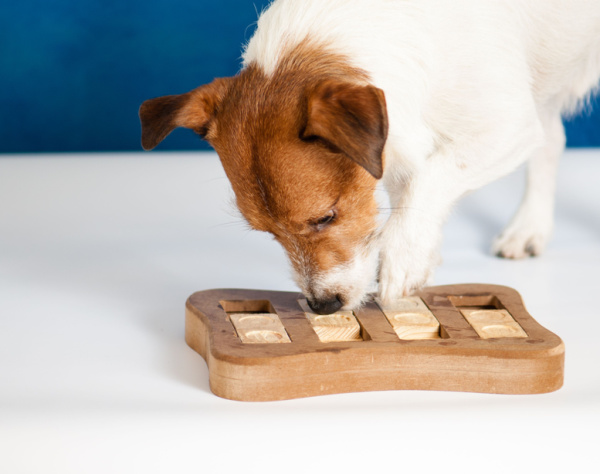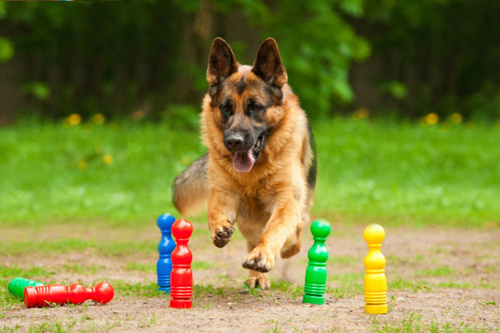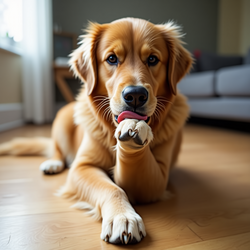
Why do dogs lick their paws? This typical behavior can signal various issues, from allergies to anxiety.
More...
Have you ever caught your furry friend obsessively licking their paws and wondered, “Why do dogs lick their paws?”
You’re not alone. This typical canine behavior can range from a simple grooming habit to a sign of underlying health issues.
In this comprehensive post, we'll explore dog paw-licking, exploring its causes, implications, and solutions with expert insights from veterinarians.
Why Do Dogs Lick Their Paws? Unraveling the Mystery
Dogs often lick their paws, leaving many pet owners puzzled. This behavior isn't just a quirky habit; it serves various purposes.
Sometimes, it's simply part of their grooming routine, helping to keep those furry feet clean and tidy.
However, excessive paw-licking can signal underlying issues that demand attention.
From allergies to anxiety, the reasons behind this behavior are diverse.
Environmental irritants like pollen or chemicals may trigger itching and subsequent licking.
Alternatively, when stressed, your furry friend might use this action as a self-soothing mechanism.
Whatever the cause, understanding why dogs lick their paws is crucial for maintaining their health and happiness.
Indeed, understanding why dogs lick their paws is crucial for maintaining their overall well-being.
If you notice persistent licking, it's best to consult with a veterinarian to rule out any serious concerns.
Proactive veterinary visits enable early detection and management of diverse dog health issues.
The Science Behind Paw Licking: More Than Just a Habit
Why do dogs lick their paws? It’s not just a quirky behavior; there’s often a scientific explanation behind it.
Intriguingly, let’s explore the various reasons that drive our canine companions to engage in this behavior.

Natural Grooming: Keeping Those Paws Pristine
Just as cats meticulously groom themselves, dogs have cleaning rituals.
Interestingly, paw licking is often a part of dogs' self-grooming routine.
After a romp in the park or a muddy walk, your dog might lick its paws to remove dirt and debris.
As a result, this instinctive behavior helps maintain hygiene and prevent potential infections.

Soothing Sensation: Nature’s Stress-Reliever
Interestingly, the act of licking releases endorphins in a dog’s brain.
Remarkably, these "feel-good" hormones can provide a calming effect, so you might notice your dog licking its paws when it's anxious or stressed.
In essence, it’s their way of self-soothing in uncomfortable situations.
Allergic Reactions: When the Environment Fights Back
A frequent trigger for excessive paw licking in canines is allergic reactions.
Similar to their human counterparts, canines can develop sensitivities to a range of environmental elements:
- Pollen from trees and grasses
- Dust mites
- Mold spores
- Certain food ingredients
Contact with allergens often results in paw irritation and itchiness, prompting dogs to lick excessively to soothe the uncomfortable sensation.
To address this issue, veterinarians often investigate why dogs lick their paws to diagnose potential health issues.
When Paw Licking Becomes Problematic: Recognizing the Red Flags
While occasional paw licking is typical, excessive licking can lead to many problems. Here’s what to watch out for:
Hot Spots: The Vicious Cycle of Irritation
Constant licking can create moist, irritated areas on the skin called hot spots.
Infections can develop in these areas, causing discomfort and prompting your dog to lick even more. You need to break this cycle for your dog’s well-being.
Yeast and Bacterial Infections: The Hidden Dangers
The warm, moist environment created by excessive licking is a breeding ground for yeast and bacteria.
Consequently, these microorganisms can cause infections, leading to redness, swelling, and a foul odor.
Behavioral Issues: When Licking Becomes an Obsession
In some cases, paw licking can develop into a compulsive behavior. Anxiety, boredom, or stress often trigger this compulsive paw-licking.
If left unchecked, this excessive licking behavior can interfere with your dog’s quality of life.
Why Do Dogs Lick Their Paws? Effective Solutions
Now that we understand why dogs lick their paws let’s explore some solutions to address this behavior, including expert advice from veterinarians:
1. Thorough Examination: Dr. Valentina Henao, a veterinarian and medical director at Veterinary Emergency Group (VEG) in Miami, emphasizes the importance of a comprehensive check-up. “We must rule out underlying medical conditions before addressing behavioral issues,” she states.
2. Allergy Testing: Many vets recommend allergy testing to identify specific triggers. The allergy testing process can include blood tests or intradermal skin tests.
3. Medication Options: Depending on the cause, your vet might prescribe:
- Antihistamines for allergies
- Anti-inflammatory drugs for pain or swelling
- Antibiotics for bacterial infections
- Antifungal medications for yeast infections
4. Dietary Changes: Dr. Henao suggests dogs under one year old often develop food allergies. Your vet might recommend a hypoallergenic or novel protein diet to identify and eliminate food allergens.
5. Topical Treatments: Therapeutic cleansers, mists, or cloths may alleviate skin discomfort and quell persistent scratching.
6. Pest Control: Implementing regular flea and tick prevention measures is vital, as these parasites can trigger intense itching and subsequent paw licking.
Observing when and why dogs lick their paws can provide insights into their emotional state.
Providing safe chewing options can redirect your dog's attention from excessive paw licking.
Identifying and Treating Allergies: A Step-by-Step Approach
1. Consult with your veterinarian for allergy testing
2. Implement dietary changes if food allergies are suspected
3. Use hypoallergenic shampoos and wipes to remove allergens from your dog’s paws
4. Consider antihistamines or other medications as recommended by your vet
Addressing Anxiety and Boredom: Enriching Your Dog’s Life
1. Increase physical exercise with regular walks and playtime
2. Provide mental stimulation through puzzle toys and training sessions
3. Foster a tranquil atmosphere using calming sounds or pheromone-releasing devices
4. Consider professional behavioral therapy for severe cases
Proper Paw Care: Prevention is Better Than Cure
1. Regularly inspect your dog’s paws for injuries or foreign objects
2. Trim nails and the hair between paw pads to prevent irritation
3. Use protective booties during extreme weather conditions
4. Rinse paws after walks to remove potential allergens or irritants
When to Seek Professional Help: Don’t Wait Too Long
If your dog’s paw licking persists despite home remedies, it’s time to consult a veterinarian. They can:
- Perform a thorough physical examination
- Conduct allergy tests or skin scrapings
- Prescribe appropriate medications or treatments
- Refer you to a veterinary dermatologist or behaviorist if needed
Dr. Henao advises, “If you notice bleeding, swelling, limping, or pain when touching your dog’s paws, seek veterinary care immediately. These could indicate more serious underlying issues.”

In the Final Analysis
Grasping the reasons behind canine paw-licking is vital for all dog owners.
You can safeguard your canine companion's health and happiness by identifying symptoms, uncovering root causes, and applying targeted remedies.
Remember, while paw licking can be regular, excessive licking often signals an underlying issue that needs attention.
Stay observant, be proactive in your dog’s care, and don’t hesitate to seek professional help when needed.
With the right approach, you can help your canine companion maintain healthy, happy paws and enjoy a better quality of life.
Exploring the question “Why do dogs lick their paws” in depth equips pet owners with the knowledge to make well-informed choices regarding their dogs’ health and conduct.
After all, a well-informed pet parent is the best advocate for their furry friend’s well-being.
Frequently Asked Questions: Addressing Common Concerns
Is it normal for dogs to lick their paws occasionally?
Indeed, sporadic paw licking is a typical aspect of a dog’s self-care routine.
Nevertheless, if this behavior intensifies or you detect any alterations in your dog’s paws, it’s advisable to look into the matter further.
Can certain breeds be more prone to paw licking?
While dogs can develop paw-licking habits, some breeds are more susceptible to allergies or skin conditions that may lead to increased paw-licking. These include:
- Retrievers (Labrador and Golden)
- Terriers
- Bichon Frises
- Bulldogs
How can I tell if my dog’s paw licking is due to anxiety or a medical issue?
Pay attention to the circumstances surrounding the licking behavior. If it occurs during stressful situations or when your dog is left alone, anxiety might be the culprit.
However, a medical issue is more likely if you notice redness, swelling, or your dog favoring a particular paw. When in doubt, always consult with your veterinarian.
What natural solutions exist to curb excessive paw licking?
While essential to address the underlying cause, some natural deterrents can help discourage licking:
- Apple cider vinegar solution (diluted 50/50 with water)
- Coconut oil (also moisturizes paw pads)
- Bitter apple spray
Always patch-test these remedies and consult with your vet before using them extensively.


